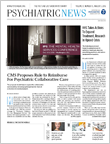Reducing Prescription Drug Abuse
We as psychiatrists are well aware that prescription drug abuse is a serious health problem of epidemic proportions in this country. Patients are often unable or unwilling to disclose their use of controlled substances, leaving prescribers and pharmacies unaware of the potential for harmful drug interactions and risk of overdose. De Marco and coworkers found that psychiatric patients are especially vulnerable to controlled substance misuse.
We need to be proactive in identifying and helping patients who are abusing prescription medications. Patients whom I have treated for such abuse report that they feel more relief than they expected. They are also more receptive to healthy lifestyle changes such as sleep hygiene, regular gentle exercise, and healthy eating. Being in treatment for substance abuse can provide a window of opportunity for compliance with psychotherapy.
To protect vulnerable patients, I believe that psychiatric outpatient clinics and acute care wards should establish prescribing standards for medications that are frequently abused. At intake and follow-up appointments these standards for safe prescribing should be shared with patients so that patients are aware that there is organizational support for prescribers who want to be careful about the amount, frequency, and duration of prescribed controlled substances. Also, before prescribing a controlled substance, we need to take the time to review the state prescription drug monitoring program database.
Moreover, we need to be sensitive to the warning signs that patients may be abusing controlled substances, such as multiple doctor switching, multiple doctors prescribing at the same time, frequent reports of lost or stolen scripts, refusing to get police reports to document these claims, phone calls from multiple states demanding refills to be called in to a pharmacy outside the state, and verbal abuse of prescribers who want to check that the medication is being used properly.
Access to treatment continues to be a problem, and I urge more psychiatrists to get training to prescribe buprenorphine, Suboxone, and other medication-assisted treatments. Health care organizations should have policies to identify dual-diagnosis patients so that doctor switching and other unhealthy ways of coping with addictions are addressed within short-term and long-term goals outlined in the patients’ initial treatment plan.
Geraldine Idoniboye, M.D. (Johnstown, PA.) ■
Parting Words
Twenty-five years ago, in these pages, I proposed a nationwide—eventually, a worldwide—computerized patient-information system listing, in chronological order and updated periodically, individual patients’ diagnoses, characteristic symptoms, and treatment. Such a system could help reduce the incidence of misdiagnosed, factitious, and malingered cases.
As I now prepare to retire from psychiatric practice, no such unitary system exists. Instead, there has been a proliferation of mutually incompatible systems that do not intercommunicate. The perverse argument that such chaos affords additional protection for patients’ confidentiality was tellingly answered some years ago by a Newsweek article titled “Confidentiality Can Kill.”
If a unitary medical information system existed, imagine falling ill while traveling far from home. A local physician enters your secure identifiers into the system and immediately receives the complete case history needed to help plan your treatment. Such a system could be lifesaving.
Approaching retirement, I would like to make another proposal.
Soon after I began residency training, I consulted the program director about a patient who was diagnosed with schizophrenia.
“Viral schizophrenia?” riposted the director.
He was using gentle sarcasm to remind me that DSM-III required specific names for particular “types” of schizophrenia. I had consciously omitted stating one, as it seemed to me immaterial to the patient’s treatment. Now the current DSM-5, published in 2013, does without the old schizophrenia typology (though ICD-10 retains it).
About the time that I was completing my residency, our profession’s program of rationalizing psychiatric terminology had replaced the Greek diagnostic term “paranoia” with the more intuitive “delusional disorder,” and it seemed to me that it might be time to do something about the last weird Greek term, “schizophrenia”—which a psychiatrically naïve public has tended to interpret as “split personality” and which pretentious commentators use in describing “schizophrenic” (paradoxical or dilemmatic) life situations. Switching to a more transparent term would seem especially appropriate as we do not know the cause of what the term’s author, Eugen Bleuler, pointedly referred to in the plural as “the schizophrenias.”
In a February 2 editorial in the BMJ titled “ ‘Schizophrenia’ Does Not Exist,” Dutch psychiatry professor Jim van Os has proposed renaming “schizophrenia” to “psychosis spectrum disorder.” He argues that the term “schizophrenia” only reifies an apparently heterogeneous diagnostic construct, obfuscates the nature of the syndromes in question, and creates an unhelpful sense of hopelessness about their prognoses.
Replacing the term “schizophrenia” with something more intuitive might take “schizophrenic situations” out of public discourse and remove some of the recondite aura that still surrounds psychiatry.
Christopher Kasparek, M.D. (Salinas, Calif.) ■
